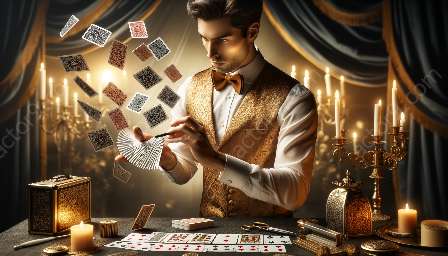Card tricks and manipulations have long been a source of wonder and amazement for audiences around the world. Understanding the psychological factors that influence the success of these tricks can provide valuable insights into the art of magic and illusion.
The Power of Deception
One of the key psychological factors that contribute to the success of a card trick is the power of deception. Magicians use a combination of misdirection, sleight of hand, and psychological manipulation to create illusions that defy logic and reason. By understanding how the human brain processes information and perceives reality, magicians are able to exploit cognitive biases and create experiences that leave audiences in awe.
The Role of Attention and Focus
Another important psychological factor is the role of attention and focus. Successful card tricks rely on the magician's ability to capture and hold the audience's attention, guiding their focus to specific elements of the performance while diverting it from others. This manipulation of attention is crucial in creating the perfect conditions for the trick to unfold without detection.
The Element of Surprise
The element of surprise plays a significant role in the success of card tricks. Magicians often leverage people's expectations and preconceived notions to set the stage for unexpected revelations. By exploiting the human tendency to seek patterns and predictability, they are able to create moments of genuine astonishment.
The Psychology of Belief and Suspense
Belief and suspense are psychological states that magicians skillfully manipulate to enhance the impact of their tricks. By creating an atmosphere of uncertainty and anticipation, magicians heighten the emotional investment of their audience, making the eventual reveal all the more satisfying and astonishing.
Building a Sense of Wonder and Amazement
Ultimately, the success of a card trick hinges on the magician's ability to elicit a sense of wonder and amazement in their audience. This requires a deep understanding of human psychology, including our propensity for curiosity, our susceptibility to suggestion, and our capacity for experiencing awe.
Conclusion
Card tricks and manipulations are not merely exercises in sleight of hand and dexterity; they are intricate displays of psychological mastery. By harnessing the power of deception, attention, surprise, belief, and wonder, magicians create experiences that blur the line between reality and illusion, captivating audiences and leaving them spellbound.


















